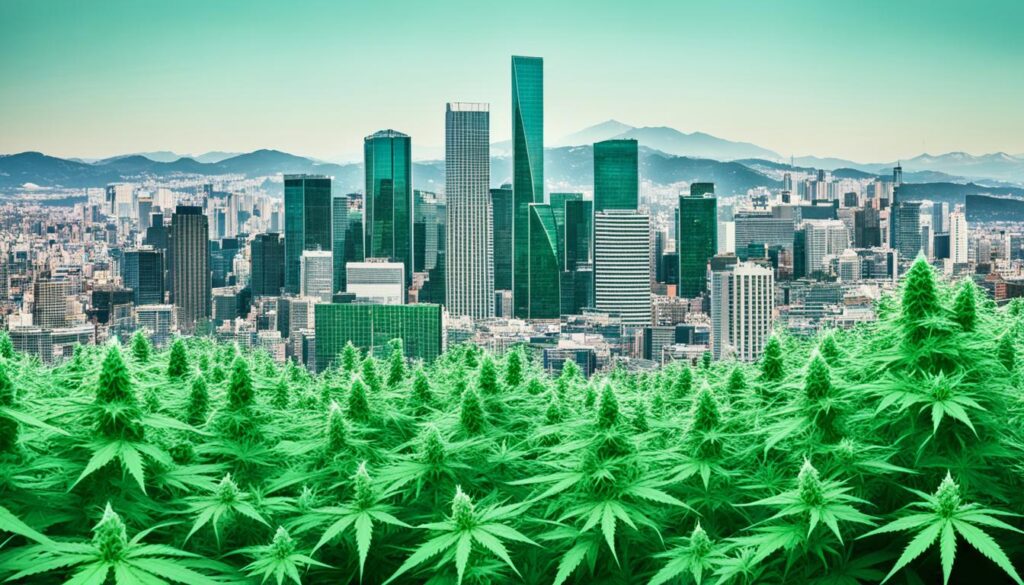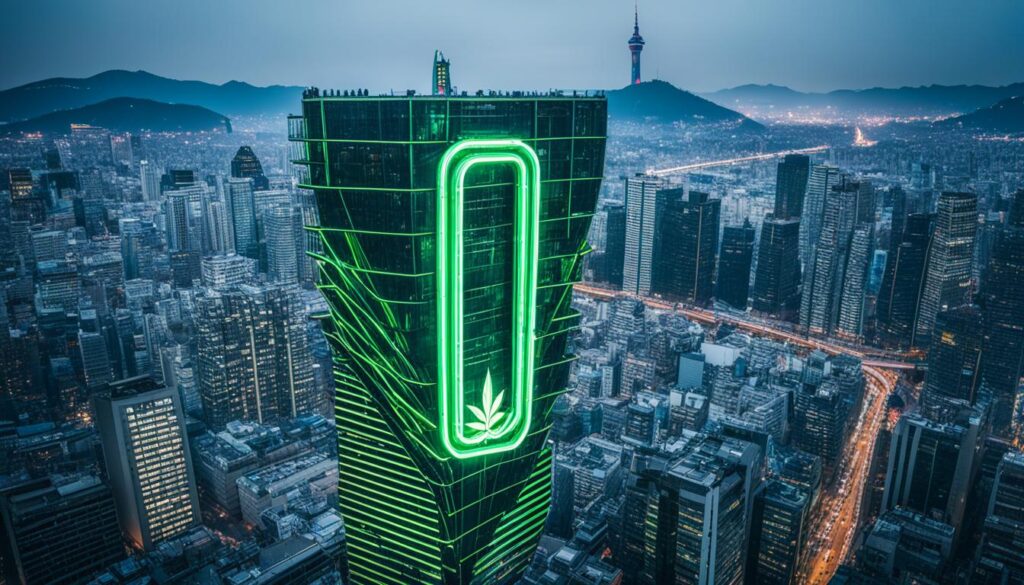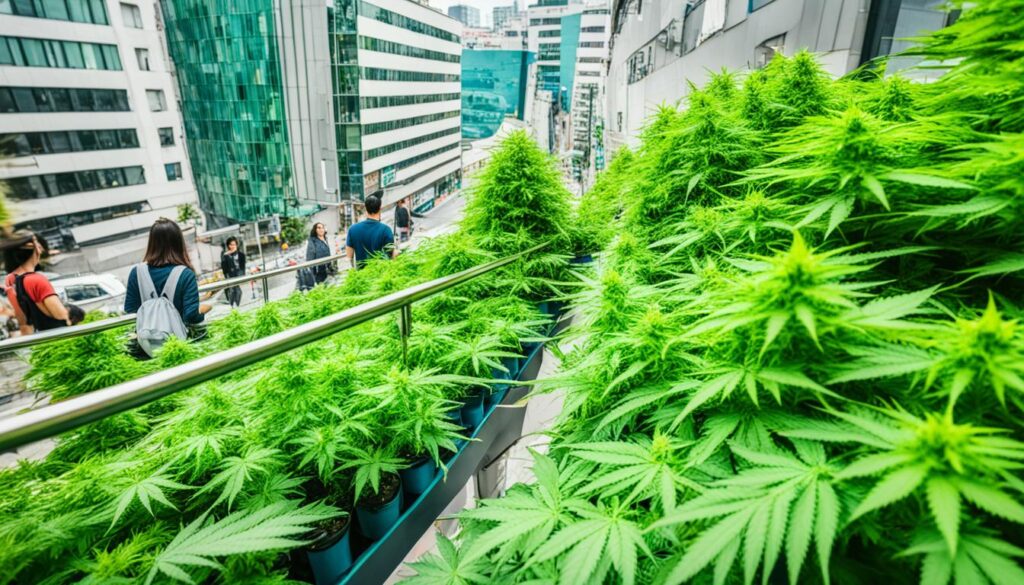South Korea has strict laws on cannabis use. This includes for fun and for health reasons. If you break these laws, you could face big fines or even jail.
In 2018, South Korea made a big move. It became the first country in East Asia to allow some cannabis medicines. These medicines help with things like epilepsy, HIV/AIDS, and cancer.
It’s important to know about South Korea’s cannabis laws. This is true for both people living there and visitors. We’ll talk about the history, laws, challenges, and what the future might hold for weed in Seoul.
Key Takeaways weed in Seoul, South Korea
- South Korea has strict laws against using cannabis for fun. You could get up to 5 years in jail or a fine of up to $42,556 USD.
- In 2018, South Korea made a big step. It allowed some cannabis medicines for certain health issues.
- The laws on cannabis in South Korea are still complex. There are many challenges and stigma around it.
- Using or having any kind of cannabis is not allowed. This can lead to serious legal problems.
- Buying weed from the black market in South Korea is risky. You could face big fines, jail, a criminal record, and even be deported if you’re not from there.
History of Cannabis in South Korea
Early History and Use
Cannabis has been a big part of ancient Korean life since 3000 BCE. It came to Korea through the Silk Road trade from South Asia. People made special fabrics like sambe cloth from hemp, a type of cannabis.
Hemp seeds were also used for medicine. They helped with constipation. This shows how long cannabis has been important in Korea.
But, the laws about cannabis in South Korea have changed a lot. In 1957, making or using marijuana was banned. Then, in 1976, more rules came to make it even harder to use cannabis.
Even with tough laws, some places like the Gyeongbuk Hemp Regulation-Free Zone still let farmers grow cannabis. They can sell it for export or medical use.
| Key Events in the History of Cannabis in South Korea | Year |
|---|---|
| Earliest evidence of cannabis use in Korea, with samples of hempen fabric dating back to 3000 BCE | 3000 BCE |
| The Korean Narcotics Act prohibited the use of marijuana | 1957 |
| The Cannabis Control Act reinforced strict regulations against cannabis | 1976 |
| South Korea became the first country in East Asia to legalize the use of medical cannabis | 2018 |
South Korea’s laws on cannabis have changed a lot over time. This shows how the country’s view on cannabis has shifted. From traditional use to being used in medicine today.
Legal Status of weed in Seoul, South Korea
Medical Use
In November 2018, South Korea changed its laws to allow medical cannabis use. It was a big step for East Asia. Now, certain cannabis medicines like Epidiolex, Marinol, and Sativex can be used with a doctor’s okay.
To get these medicines, patients must go through the Korea Orphan Drug Center. They need a doctor’s prescription and to meet government rules. But, the whole plant and its natural parts are not yet okay for medical use.
| Country | Medical Cannabis Legalization | Adult-Use Cannabis Legalization |
|---|---|---|
| South Korea | Allowed for specific medical conditions since 2018 | Not allowed |
| Uruguay | Allowed | Allowed for residents only |
| Canada | Allowed | Allowed for individuals of legal age regardless of residency |
| Malta | Allowed | Allows personal cultivation and noncommercial clubs |
| Luxembourg | Allowed | Allows limited home cultivation |
Even with new laws, South Korea is strict on cannabis. They can even sentence people to death for some crimes. The government also plans to catch people using marijuana in places like Canada.
weed in Seoul, South Korea
In Seoul, South Korea, weed is not legal but it’s getting more popular. It’s not as common as other drugs like methamphetamine. Yet, you can still find it online by talking to dealers.
Out of 11,916 drug arrests in 2015, only 1% were for weed. This shows weed use in Seoul is not huge but it’s there. It’s slowly growing.
After making medical marijuana legal in 2018, people started talking about its good and bad sides. But, using it for fun is still a big no-no. Breaking this rule can get you up to five years in jail or a big fine.
| Offense | Sentence |
|---|---|
| Administering or possessing marijuana | 8 months to 1 year and 6 months |
| Trading or assisting in the trade of marijuana | 1 to 2 years in prison |
| Importing or manufacturing marijuana | 2 to 4 years in prison |
Even with the risks, weed culture in Seoul keeps growing. Some people find weed online. The future of weed in Seoul is still up in the air.
Industrial Hemp in South Korea
South Korea has a long history with cannabis. Hemp was a common source of fabric in ancient times. In the 1930s, hemp was grown in every province, especially in the south.
Recently, in 2020, South Korea made a big step. They made the southeastern province of Gyeongbuk a zone for hemp without rules. This made it the center of the country’s cannabis industry.
This special zone lets licensed farmers grow cannabis for export and health use. It’s the only place in South Korea where this is allowed. More than one in three Koreans know about the health benefits of cannabis.
Imagination Garden is a South Korean start-up led by CEO Kim Soo-bin, 28. They use modern farming tech to grow hemp. This way, they get consistent results and save money. They also make the hemp plant shorter to get more from it.
| Metric | Value |
|---|---|
| Hemp THC Content | 0.3% or less |
| Medical Cannabis Legalization | Partially legalized in 2018 |
| Hemp Cultivation in the 1930s | Approximately 9,000 hectares |
| Recreational Cannabis Penalty | Up to 5 years in prison or $42,556 USD fine |
The Gyeongbuk hemp zone could help grow industrial hemp in South Korea. But, there are worries about how competitive they are with other countries. Still, the industry’s future looks good. The easy laws and new tech are changing industrial hemp in South Korea.
“If industrial hemp is not commercialized in South Korea, we risk losing the industrial cannabis market to China and other Western advanced countries.”
– Noah Jay, President of The Korea Cannabis Industry Association
Challenges and Stigma
In South Korea, even though medical cannabis is legal, there are big challenges and stigma. Many Koreans see cannabis as illegal drugs. They call people who grow it “junkie bastards.”
There’s also a big lack of knowledge about THC and CBD. The government and media say THC is “hallucinogenic.” But, experts say this is not true.
A 2018 poll showed 52.4% of Koreans think drugs are easy to get. Only 9.3% support legalizing marijuana. Most people want harsher punishments for drug use.
This has led to more people growing and selling drugs online. The laws are strict, causing this trend.
Drug use in South Korea is seen as a big shame. People see users as “criminals.” This stops many from getting help.
Only about 200 addicts get free therapy each year. This is sad, given the rise in young drug users.
We need more education and understanding about cannabis in South Korea. Studies show that less stigma can help people get better treatment.
Western countries are moving forward with marijuana laws. But South Korea is not. A more open approach could help South Korea too.
Economic Implications
South Korea has made big steps in the economic impact of cannabis. Now, farmers like Kim Soo-bin can grow and export cannabis for medicine. They use advanced indoor farming.
But, some experts think the zone might not be as strong as others. South Korea has made a big move, but the hemp industry and its export potential are still unsure.
| Country | Cannabis Legality | Export Potential |
|---|---|---|
| Uruguay | Fully legalized in 2013 | High |
| Canada | Fully legalized in 2018 | High |
| United States (Washington) | Recreational use legal in 10 states and D.C. | Moderate |
| South Korea | Medical use legalized in 2018 | Moderate |
| Singapore, Indonesia, Malaysia | Drug trafficking can lead to capital punishment | Low |
| Thailand | Possessing drugs can bring lengthy prison sentences | Low |
Legalizing medical cannabis in South Korea has brought new chances for the economy. But, the industry faces challenges. Experts say the economic impact of cannabis might lead to more use, causing problems.
The hemp industry in South Korea might also find it hard to compete with others. This could limit its export potential.

South Korea is figuring out how to handle the cannabis and hemp industry. It’s important to look at the economic benefits and the need for careful rules and health safety.
Cultural Impact and Perceptions
In South Korea, cannabis has made a big mark on the entertainment world. Many famous K-pop stars got in trouble for using marijuana. This led to big career setbacks for them.
They had to wait about 40 months before they could perform again after a drug scandal.
People in South Korea see cannabis like hard drugs, thanks to old teachings and the media. Back in the 1970s, laws banned cannabis, even though hemp was once used for clothes and oil. Now, using cannabis is still a big no-no, with harsh punishments.
But, young people are changing how society sees cannabis. They want more freedom and a new way of life. It’s hard for Koreans to balance old values with new ones, caught between tradition and modern life.
Brands like Sundae School are mixing Korean culture with stoner culture. Their “Genesis: Chapter Two” collection tells how cannabis can help people. It shows how cannabis is still a big secret in Korean society.
“Being Korean in 2021 is shaped by the concept of 한 / Han, embodying grief, resilience, and a balanced blend of cultural heritage and contemporary evolution.”
| Statistic | Value |
|---|---|
| Cannabis laws in South Korea | People caught smoking marijuana can face up to five years in prison and $44,000 USD in fines. |
| Medical cannabis access in South Korea | The medical cannabis system is skewed towards the wealthy, with costs estimated to be around $30,000 USD per year. |
| Sundae School’s cannabis campaign | The brand created over 420 weed nuggets by hand, reflecting the taboo nature of cannabis in Korean culture. |
Future Outlook
South Korea is moving to make medical cannabis legal. This is a big step forward. Experts think we’ll see even more changes soon. They want to make rules less strict and get more people to see the plant’s health benefits.
Now, over a third of Koreans know about cannabis’s health perks. This shows people are starting to see it in a new light. But, we still need more studies and teaching to get rid of the bad feelings about it.
The cannabis industry in South Korea will change because of a few things:
- Deregulation: People who want to help cannabis are pushing for easier rules. They want to use the plant for health and money.
- Public Acceptance: More people learning about cannabis’s health benefits will make more accept it. This will help it become more popular.
- Medical Research: South Korea is planning to spend a lot on studying cannabis for health. This is because they have a lot of older people and high health costs.
The legal marijuana market could be worth $66.3 billion by 2025. The medicinal cannabis market in Asia could be $5.8 billion by 2024. This means South Korea’s cannabis future looks bright. With the right laws and teaching the public, South Korea could lead in the cannabis industry. They could use cannabis to help with health issues.

“The shift in public perceptions, with over one-third of Koreans now aware of the medical benefits of cannabis, is seen as an encouraging sign, but more scientific research and education are still needed to overcome the lingering stigma.”
Conclusion
South Korea has a long history with cannabis, both traditional and modern. They’ve moved towards legalizing it for medical use. But, they still say no to using it for fun.
The country has made a special area for hemp. More people now know about cannabis’s health benefits. This shows they’re slowly getting more open to it.
But, there are big hurdles like social stigma and rules that make it hard. In Seoul, using cannabis can lead to jail, big fines, or even being sent away if you’re not a citizen. This is very different from what some other countries do.
As the world changes, South Korea might change its views on cannabis too. This article shows we need more talks, learning, and a fair way to look at this issue.

As a veteran weed smoker for over 30 years and been very clean for the last 3 years, I have been craving it.
One thing I’ve never done is consume it?
I came across SunJet Plug and thought mmmm how esp with legalities etc.
So I made the plunge and purchased 12 brownies, well within 30 mins it kicked in and it was immense as I had a whole one from the off 😜
The rest did not last a week I was having 2 a day and my wife lost me for a few days I was in my own world apparently.
Kudos to the Sunjet plug love em, the taste is a bit undesirable could do with a tweak or two other than that no complaints
Contact him on his telegram link: t.me/sunjetplug
His email : sunjetplug@gmail.com
Many many thanks.😁
Take note ,he does not have telegram channels
Sunjet plug is 100% legit.. I’m a repeat customer.. I’ve ordered 10+ times now, and I’ve never had an issue.. Great product, great service.
Sunjet plug is extremely trust worthy , they never fail in what ever product I order, and its always in my hands with an hour of ordering 99% of the time….. its honestly rare when its more than 2 hours and that’s only because its the weekend when ive orded or a national holiday is on or something lol …. brilliant service I’m probably pushing maybe 2 months with them and I’ve never been disappointed ❤️ my only recommendation would maybe do a stamp card to get something free after 5 orders or a loyalty bonus of some kind ❤️
Email sunjet.. sunjetplug@gmail.com